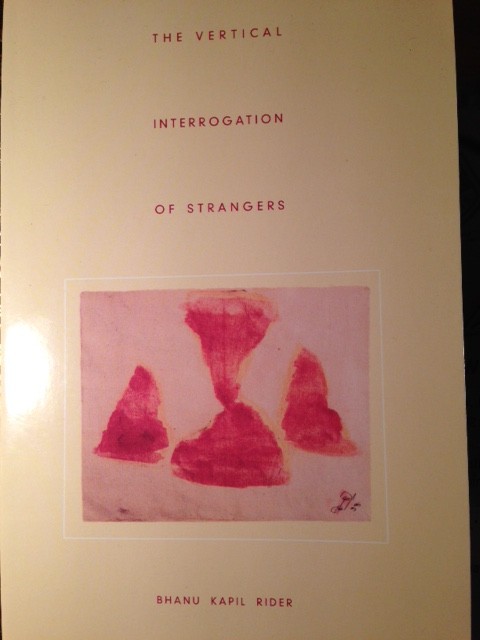The vivid sumptuousness of Kapil’s language, the unconventional daring of both content and style dazzled my senses, left me dizzy for more. I went and purchased all of her books, and I’ve been slowly working my way through them – very slowly, in fact, because these are the kinds of books that you simultaneously want to devour and never finish; the kinds of books in which each sentence could be unpacked for hours or days and still be powerfully rewarding.
Recently I stumbled upon notes I had written while reading Bhanu’s first novel, The Vertical Interrogation of Strangers (Kelsey Street Press, 2001), and I thought that I would share them here.
Notes on Reading The Vertical Interrogation of Strangers
The Vertical Interrogation of Strangers is: an exploration – or more, a presentation of loss in the way a painting is a presentation, an offering of (visual) clues to which the viewer/reader may ascribe meaning.
It is an uttering of goodbye to: her lover/husband/father of her son; but also to herself, many of her old faces, memories, past emotional lives.
It is a farewell to convention.
It is a beginning – a new way of writing, and a new way of being.
It is an acceptance of hybridity, non-conformity. An acceptance that not everything is linear or makes sense; an acceptance that, in fact, most things never are or do.
It is: a way of painting with words.
It is suffused with pain – physical, visceral – like a butterfly clawing out of its cocoon.
It is both a birth, and a death. A shedding of old skin, and a waking up.
It is suffused with longing, desire, love, lust. It is a crying out for all of these things.
It is an attempt to claim a past and make it whole even while accepting that history can never be whole, it will always be partial – partially remembered, partially forgotten, partially recreated.
It is an attempt by the author to birth herself: her new identity as woman/writer/mother.
It is about sex.
It is about innocence.
It is about betrayal.
It is an experience of the senses. You can almost taste it. The taste you can almost touch is: salty. Like seawater, like tears.
It is an account of an itinerant wanderer wandering and coming back full circle to: herself.
It is a love letter: to her lover, to the reader, to herself.
It is an offering: to her lover, to the reader, to herself.
It is an invitation: to enter: a cave.
